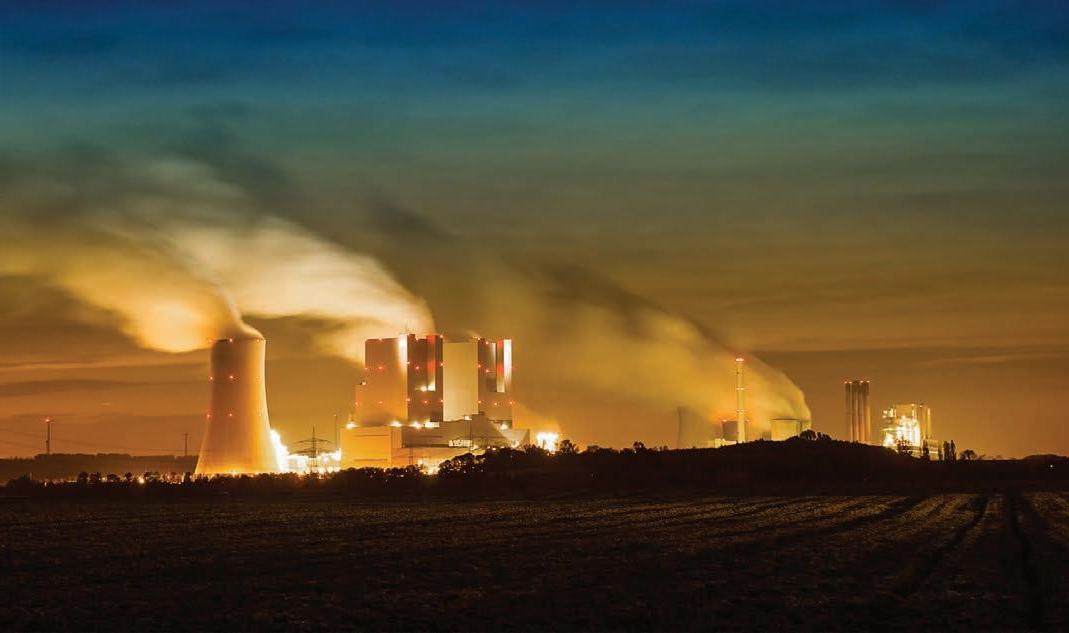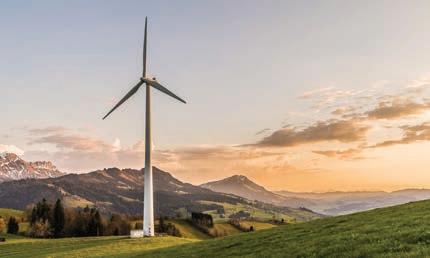
14 minute read
Power
Asserting that reforms in the regulatory and process framework have significantly 'improved' the outlook towards the power sector, Prime Minister Narendra Modi on Thursday said the Centre is working to remove problems in the distribution sector and a policy and regulatory framework for DISCOMs is in the offing. Consumers should be able to choose their implementation of the Union Budget provisions in the power and renewable energy sector, the Prime Minister's Office (PM) said in a statement. Modi said the government treats power as a separate sector and not as part of the industry sector, while adding that the Centre's approach towards it has been holistic and guided by the four mantras of "reach, reinforce, reform and renewable energy". He noted that the renewable energy capacity of the country has been enhanced by two-and-a-half times in the last six years and the solar energy capacity by 15 times. Referring to the PLI (performance-linked incentive) scheme, he said high-efficiency solar PV modules are now part of it and the government is committed to investing Rs 4,500 crore in this. Modi hoped for a massive response to the scheme. Under the PLI scheme, integrated solar PV manufacturing plants with a capacity of 10,000 MW will be operationalised with an estimated investment of Rs 14,000 crore.
Advertisement
Power Min reduces discom penalties to 5 per cent over SBI lending rate
The government has lowered the late payment fee chargeable by power and transmission developers
from distribution companies by linking it to State Bank of India's lending rate against the current 18 per cent. The Electricity (Late Payment Surcharge) Rules 2021 exclude existing power plants and transmission systems whose tariffs have been determined through competitive bidding. The rules bar electricity distribution companies with any outstanding bills after seven months from due date from procuring power from power exchanges or grant of short -term open access. The rules came into force on Monday when they were notified. The gazette notification issued by the power ministry evoked mixed response from the industry as it supersedes regulations of the Central Electricity Regulatory Commission (CERC) and also the power purchase/transmission agreements. CERC chairperson P K Pujari had in October sent a statutory advice to the government against issuance of the rules citing jurisdictional overlap. The power distribution companies welcomed reduction in late payment fee while electricity generation plants and transmission companies with regulated tariffs said lowering of the penalty rates interest would discourage timely payments by states
Moody's upgrades power sector outlook to stable on generation uptick
Rating agency Moody's on Monday upgraded the outlook on the power sector to stable from negative, citing the fifth consecutive month of generation growth in January. The Central Electricity Authority last week reported a 3.1 per cent year-on-year growth in power generation in January, making it the fifth consecutive month of generation growth after six months of decline driven by coronavirus pandemic. For the first 10 months of the fiscal 2021, power generation growth declined 2.9 per cent year-on, compared to earlier expectations of a minimum 4-5 per cent decline. But renewable energy generation (excluding hydro power) grew 4.3 per cent during the same period and wind the weakest down 12 per cent. "We have changed the outlook for the power sector to stable from negative, recognising the better prospects for the sector as a result, amid an improved macroeconomic backdrop," Moody's said in a note. Sustaining generation growth indicates stabilization of the operating environment, which was severely impacted by the lockdowns. Our expectations of a rebound real GDP growth to 10.8 per cent in fiscal 2022 further underpins the potential for improving power demand and a more stable picture for the sector, it said.
States to be consulted on amended power Bill
The Union ministry of power is holding consultations with its state energy counterparts on Wednesday on the proposed Electricity (Amendment) Bill, 2020. The central government had proposed the new Bill in 2020, amending the original Electricity Act, 2003. The Centre has proposed privatisation of power distribution, withdrawal of subsidies in power bills, besides promoting renewable energy. The Bill proposes introduction of private licenses in distribution through which discoms would lease out the distribution network. The Bill also proposes withdrawing subsidies from power bills. Consumers, however, would get direct cash benefit if the government extends the subsidy. Farmers and other sectors that previously were granted power subsidy will now have to pay the total bill amount. Any subsidy will be in the form of a direct cash benefit. Discoms or their private partners will collect the unsubsidised tariff from the consumer. The Bill also proposes a National Renewable Energy Policy that mandates the states to purchase a percentage of renewable energy as fixed by the Centre.
Now, discoms must clear dues to purchase power
In a move that could push the already beleaguered power distribution companies into more trouble, the Centre has brought changes to the Electricity Act to suspend discoms from buying power if they fail to clear dues to generation companies beyond six months.
The Centre has also brought in a clause in the Act to impose penalties on the discoms for late payment of dues. The Centre on Monday issued a notification by amending the Electricity Act, 2003, to make discoms clear the dues on time. As per the new guidelines stipulated by the Centre, discoms cannot escape from paying dues to the Gencos (PPAs) and Transcos (TSA) beyond one month. “Discoms will be penalised with a 0.5% penalty on the total due to the firm from which it procured power, either Genco or private power developer, in case it fails to pay the dues after 30 days. This is aimed at making the discoms cough up at any cost and push them into more debts and losses,” said AP Assistant Executive Engineers (AEEs) Association president Vamsi Srinivas. Similarly, the penalties would keep growing for six months as the Centre has capped the maximum penalty at 3%. Surprisingly, the Centre has given liberty to the transmission company or the power supplier (private developer) to stop the supplies to the particular discoms and force the company to pay the dues.
CERC norms: ‘Market coupling’ mechanism for spot power market gets a leg-up
Analysts said the new regulations will help increase the share of spot power in electricity purchased by discoms and large industrial consumers. The move is seen to dent the market dominance of the Indian Energy Exchange (IEX), where currently around 94% of the spot market transactions take place and catalyse formation of new exchanges. The move is seen to dent the market dominance of the Indian Energy Exchange (IEX), where currently around 94% of the spot market transactions take place and catalyse formation of new exchanges. The Central Electricity Regulatory Commission (CERC) has introduced the ‘market coupling’ mechanism for spot power trading, a move which could align spot prices within same geographical areas and time slots, and encourage exchanges to attract consumers via improved quality of supply, payment flexibility, etc. The move is seen to dent the market dominance of the Indian Energy Exchange (IEX), where currently around 94% of the spot market transactions take place and catalyse formation of new exchanges. In its latest power market regulation, the CERC also capped the transaction fee charged by the exchanges to two paise per unit. Though the rate is similar to the current margin levels earned by exchanges, the role of the regulator was restricted to oversight under the old regulations while the board of exchanges would determine the margins.
Centre cannot charge GST on power services: Rajasthan High Court
The Rajasthan High Court (HC) has quashed a clarification issued by the Union government that had allowed the authorities to impose goods and services tax (GST) on certain portions of power supply. Power distribution services draw zero GST rate since they fall under the negative list of services released by the Union government in 2017. However, the Central Board of Indirect Taxes and Customs (CBIC) came out with a circular in 2018 imposing GST on various activities, such as application fee for releasing electricity connection, rental charges against metering equipment, testing fee for meters, capacitors, and duplicate bill charges. The circular was issued after the GST Council made recommendations to that effect, said Harpreet Singh, partnerindirect taxes, KPMG. The HC circular restrained the Union government from raising any demand and taking coercive measures to recover any tax on the basis of an impugned order.
Off-grid solar industry bracing for impact of import duty hike for lanterns and inverters
With a goal of promoting local manufacturing, India’s new budget tripled to 15 per cent the duty on imported solar lanterns, while the duty on solar inverters would rise from 5 per cent to 20 per cent. The off-grid solar industry, which already saw a 10 per cent decline in solar lantern sales in 2019-2020, is bracing for an ever bigger hit because of the new tariffs. As a result, off-grid industry executives are calling for a more measured approach that accounts for the current gap in quality local production while ensuring that India’s rural poor are protected from expected price hikes until that gap is filled. According to Ministry of Commerce statistics, more

than 95 per cent of the roughly six million solar lanterns sold in India in 2019-2020 came from China. As a result, India lacks capacity to immediately replace those millions of quality-assured solar lanterns with domestic production. At present, there is only one locally manufactured product (a Frontier Markets torch) that has passed standards established by the IFC Lighting Global Framework. It will be important for the domestic market to keep a focus on the consumer and ensure they get access to safe, high-performing, affordable, and durable products. Adhering to global quality assurance frameworks is a first step.
CSE opposes proposal to extend emission norms deadline for thermal power plants
The Centre for Science and Environment (CSE) has cautioned the Ministry of Environment, Forest and Climate Change (MoEF&CC) against agreeing to the Power Ministry’s proposal for extending the deadline of meeting emission norms for coal-based thermal power plants in the country. The Ministry of Power has requested the MoEF&CC to extend the deadline for all thermal plants from 2022 to 2024. Virtual assessment, which seeks to eliminate human interface, is welcome, provided the principles of fairness and equity are not eroded “Extending the deadline once again will have grave repercussions for the fight against air pollution. It will also mean a complete mockery of the Supreme Court and Indian regulators’ efforts to control pollution from the coal-based thermal power sector over the last five years,” said SunitaNarain, Director-General, CSE. The extension was sought on the account of uncertainties and delays due to the Covid-19 pandemic, and other issues like import restrictions, lack of local availability of components, liquidity crunch in the power sector, credit refusals due to high stress in the sector, regulatory delays etc.
Gadkari urges power minister to reconsider restriction on solar rooftop projects
Union micro, small and medium industries minister NitinGadkari has urged power minister R K Singh to reconsider a recent controversial decision to restrict net metering in solar rooftop projects. The power ministry had recently issued a gazette notification directing states to henceforth allow net metering only for solar rooftop projects with capacity lower than 10 KW. Those with higher capacity needs to shift to gross metering. With most solar rooftop installations in the commercial and industrial (C&I) segment being above 10 KW, developers had strongly protested the step. Discoms in many states have been lobbying against net metering, arguing that the system robs them of legitimate revenue. This is because the tariff discoms pay while buying power from developers is markedly lower than the tariff at which they sell power to consumers. In a letter to Singh dated February 15, Gadkari noted that while more and more micro, small and medium enterprises (MSMEs) were installing solar rooftop projects, thereby contributing to the share of clean energy in the grid, the notification might well discourage them.
TERI, POSOCO sign MoU to encourage research in domestic power sector
The Energy and Resources Institute on Monday signed an MoU with Power System Operation Corporation (POSOCO) to encourage research in the domestic power sector. According to the statement, "The two have agreed to work together to strengthen research-industry interaction for knowledge sharing and capacity building through collaboration, and to encourage research on issues related to the Indian power sector." Joint endeavours under the MoU pertain to further developing power system simulation models, integrated resource planning, including demand and supply, on a short-term, medium-term and long-term perspective. Preparation of joint reports and capacity building of state utilities is also part of the MoU. K V S Baba, Chairman and Managing Director, POSOCO Ltd, said "With its rich experience in the power sector, TERI, together with POSOCO, can produce extensive research reports backed with evidence to gain confidence in robust power systems operation.
Power Minister R K Singh calls for study on impact of hydro projects
Power Minister R K Singh brushed aside apprehensions that water storage or dam projects, which also generate hydro electricity, harm environment, and urged experts to commission an authoritative and scientific study to find out the truth. Singh said, "I have not seen science of environment being harmed. I see science of progress in this (water storage). Punjab and Haryana developed and they are where they are today because of BhakraNangal dam." He further said, "If you ask any person in Bihar, then his dearest wish is to construct large dams on the river Kosi in Nepal. Wherever we constructed large dams, we have improved the lives of people...generations. This is the message we need to convey." He brought attention toward pushback to water storage or dam projects in the country by NGOs (nongovernment organisations) or civil societies which claim that these would harm environment. “In water resources, in the past decade also, we have faced headwinds in harnessing our water resources. There was concerted movement against harnessing the water, dams, against any project which sought to harness our water resources." Currently, India is developing around 14,000 megawatts of hydropower generation capacity.
Continuum Wind Energy Ltd, sponsored by Singapore-based Clean Energy Investing Ltd, the indirect wholly-owned subsidiary of a Morgan Stanley fund entity, New Haven Infrastructure Partners, plans to issue its maiden green bond of $500-600 million, to be listed on the SGX. The proceeds will be used to refinance the project debt at six of its operating entities and to set up wind projects in India. The proceeds of the green bond will be used to refinance the project debt at six of its operating entities of the Continuum Group which together will form part of a bond issuing Restricted Group (RG1). IFC investment consists of the subscription to this green bond of an amount of upto $75 million for a tenor of 6 years. The proposed IFC investment has both strong financial and non-financial additionality. IFC will be facilitating access to international capital markets for a first-time issuer through an innovative financial structure that will help the sector in tackling lack of suitable domestic market financing options during the ongoing pandemic.
Continuum Wind Energy Ltd, sponsored by Singapore-based Clean Energy Investing Ltd, the indirect wholly-owned subsidiary of a Morgan Stanley fund entity, New Haven Infrastructure Partners, plans to issue its maiden green bond of $500-600 million, to be listed on the SGX. The proceeds will be used to refinance the project debt at six of its operating entities and to set up wind projects in India. The proceeds of the green bond will be used to refinance the project debt at six of its operating entities of the Continuum Group which together will form part of a bond issuing Restricted Group (RG1). IFC investment consists of the subscription to this green bond of an amount of upto $75 million for a tenor of 6 years. The proposed IFC investment has both strong financial and non-financial additionality. IFC will be facilitating access to international capital markets for a first-time issuer through an innovative financial structure that will help the sector in tackling lack of suitable domestic market financing options during the ongoing pandemic. In addition, IFC will contribute to strengthening the company's E&S practices through the adoption of IFC's performance standards, said IFC. RG1 has an aggregate capacity of 722.9 mega watt, comprising operational wind and solar assets which have Madhya Pradesh and Maharashtra as off takers and power purchase agreements with C&I customers in Gujarat and Tamil Nadu.






